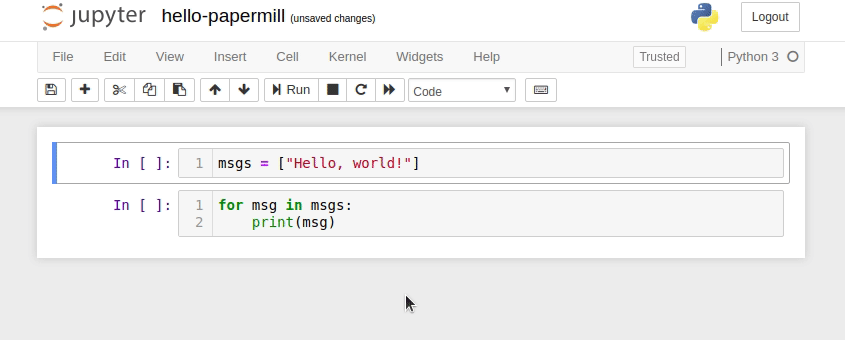1
2
3
4
5
6
7
8
9
10
11
12
13
14
15
16
17
18
19
20
21
22
23
24
25
26
27
28
29
30
31
32
33
34
35
36
37
38
39
40
41
42
43
44
45
46
47
48
49
50
51
52
53
54
55
56
57
58
59
60
61
62
63
64
65
66
67
68
69
70
71
72
73
74
75
76
77
78
79
80
81
82
83
84
85
86
87
88
89
90
91
92
93
94
95
96
97
98
99
100
101
102
103
104
105
106
107
108
109
110
111
112
113
114
115
116
117
118
119
120
121
122
123
124
125
126
127
128
129
130
131
132
133
134
135
136
137
138
139
140
141
142
143
144
145
146
147
148
149
150
151
152
153
154
155
156
157
158
159
160
161
162
163
164
165
166
167
168
169
170
171
172
173
174
|
# <a href="https://github.com/nteract/papermill"><img src="https://media.githubusercontent.com/media/nteract/logos/master/nteract_papermill/exports/images/png/papermill_logo_wide.png" height="48px" /></a>
<!---(binder links generated at https://mybinder.readthedocs.io/en/latest/howto/badges.html and compressed at https://tinyurl.com) -->
[](https://github.com/nteract/papermill/actions/workflows/ci.yml)
[](https://github.com/nteract/papermill/actions/workflows/ci.yml)
[](https://codecov.io/github/nteract/papermill?branch=main)
[](http://papermill.readthedocs.io/en/latest/?badge=latest)
[](https://mybinder.org/v2/gh/nteract/papermill/main?filepath=binder%2Fprocess_highlight_dates.ipynb)
[](https://mybinder.org/v2/gh/nteract/papermill/main?)
[](https://pypi.org/project/papermill/)
[](https://github.com/ambv/black)
[](https://snyk.io/advisor/python/papermill)
[](https://anaconda.org/conda-forge/papermill)
[](https://results.pre-commit.ci/latest/github/nteract/papermill/main)
**papermill** is a tool for parameterizing, executing, and analyzing
Jupyter Notebooks.
Papermill lets you:
- **parameterize** notebooks
- **execute** notebooks
This opens up new opportunities for how notebooks can be used. For
example:
- Perhaps you have a financial report that you wish to run with
different values on the first or last day of a month or at the
beginning or end of the year, **using parameters** makes this task
easier.
- Do you want to run a notebook and depending on its results, choose a
particular notebook to run next? You can now programmatically
**execute a workflow** without having to copy and paste from
notebook to notebook manually.
Papermill takes an *opinionated* approach to notebook parameterization and
execution based on our experiences using notebooks at scale in data
pipelines.
## Installation
From the command line:
```{.sourceCode .bash}
pip install papermill
```
For all optional io dependencies, you can specify individual bundles
like `s3`, or `azure` -- or use `all`. To use Black to format parameters you can add as an extra requires \['black'\].
```{.sourceCode .bash}
pip install papermill[all]
```
## Python Version Support
This library currently supports Python 3.8+ versions. As minor Python
versions are officially sunset by the Python org papermill will similarly
drop support in the future.
## Usage
### Parameterizing a Notebook
To parameterize your notebook designate a cell with the tag `parameters`.

Papermill looks for the `parameters` cell and treats this cell as defaults for the parameters passed in at execution time. Papermill will add a new cell tagged with `injected-parameters` with input parameters in order to overwrite the values in `parameters`. If no cell is tagged with `parameters` the injected cell will be inserted at the top of the notebook.
Additionally, if you rerun notebooks through papermill and it will reuse the `injected-parameters` cell from the prior run. In this case Papermill will replace the old `injected-parameters` cell with the new run's inputs.

### Executing a Notebook
The two ways to execute the notebook with parameters are: (1) through
the Python API and (2) through the command line interface.
#### Execute via the Python API
```{.sourceCode .python}
import papermill as pm
pm.execute_notebook(
'path/to/input.ipynb',
'path/to/output.ipynb',
parameters = dict(alpha=0.6, ratio=0.1)
)
```
#### Execute via CLI
Here's an example of a local notebook being executed and output to an
Amazon S3 account:
```{.sourceCode .bash}
$ papermill local/input.ipynb s3://bkt/output.ipynb -p alpha 0.6 -p l1_ratio 0.1
```
**NOTE:**
If you use multiple AWS accounts, and you have [properly configured your AWS credentials](https://boto3.amazonaws.com/v1/documentation/api/latest/guide/configuration.html), then you can specify which account to use by setting the `AWS_PROFILE` environment variable at the command-line. For example:
```{.sourceCode .bash}
$ AWS_PROFILE=dev_account papermill local/input.ipynb s3://bkt/output.ipynb -p alpha 0.6 -p l1_ratio 0.1
```
In the above example, two parameters are set: `alpha` and `l1_ratio` using `-p` (`--parameters` also works). Parameter values that look like booleans or numbers will be interpreted as such. Here are the different ways users may set parameters:
```{.sourceCode .bash}
$ papermill local/input.ipynb s3://bkt/output.ipynb -r version 1.0
```
Using `-r` or `--parameters_raw`, users can set parameters one by one. However, unlike `-p`, the parameter will remain a string, even if it may be interpreted as a number or boolean.
```{.sourceCode .bash}
$ papermill local/input.ipynb s3://bkt/output.ipynb -f parameters.yaml
```
Using `-f` or `--parameters_file`, users can provide a YAML file from which parameter values should be read.
```{.sourceCode .bash}
$ papermill local/input.ipynb s3://bkt/output.ipynb -y "
alpha: 0.6
l1_ratio: 0.1"
```
Using `-y` or `--parameters_yaml`, users can directly provide a YAML string containing parameter values.
```{.sourceCode .bash}
$ papermill local/input.ipynb s3://bkt/output.ipynb -b YWxwaGE6IDAuNgpsMV9yYXRpbzogMC4xCg==
```
Using `-b` or `--parameters_base64`, users can provide a YAML string, base64-encoded, containing parameter values.
When using YAML to pass arguments, through `-y`, `-b` or `-f`, parameter values can be arrays or dictionaries:
```{.sourceCode .bash}
$ papermill local/input.ipynb s3://bkt/output.ipynb -y "
x:
- 0.0
- 1.0
- 2.0
- 3.0
linear_function:
slope: 3.0
intercept: 1.0"
```
#### Supported Name Handlers
Papermill supports the following name handlers for input and output paths during execution:
- Local file system: `local`
- HTTP, HTTPS protocol: `http://, https://`
- Amazon Web Services: [AWS S3](https://aws.amazon.com/s3/) `s3://`
- Azure: [Azure DataLake Store](https://docs.microsoft.com/en-us/azure/data-lake-store/data-lake-store-overview), [Azure Blob Store](https://docs.microsoft.com/en-us/azure/storage/blobs/storage-blobs-overview) `adl://, abs://`
- Google Cloud: [Google Cloud Storage](https://cloud.google.com/storage/) `gs://`
## Development Guide
Read [CONTRIBUTING.md](./CONTRIBUTING.md) for guidelines on how to setup a local development environment and make code changes back to Papermill.
For development guidelines look in the [DEVELOPMENT_GUIDE.md](./DEVELOPMENT_GUIDE.md) file. This should inform you on how to make particular additions to the code base.
## Documentation
We host the [Papermill documentation](http://papermill.readthedocs.io)
on ReadTheDocs.
|